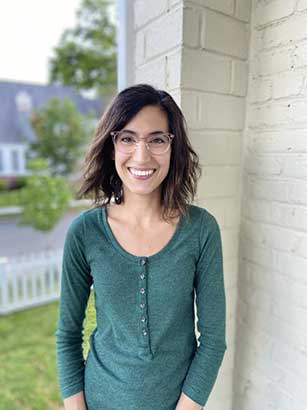 DEGREES: B.S. in psychology, minor in women, gender, and sexuality; M.S.W., Smith College
DEGREES: B.S. in psychology, minor in women, gender, and sexuality; M.S.W., Smith College
JOB TITLE: Hematology social worker at Children’s National Hospital in Washington, D.C.
FAVORITE TRINITY MEMORY: Meals in Mather and being with my friends every chance I had.
What does your work entail? I work with pediatric patients from birth to the age of 22 who are diagnosed with hematologic conditions. These can include bleeding disorders such as hemophilia, blood-clotting disorders, anemias, bone marrow failures, and certain types of histocyte cancers. I work with both inpatient and outpatient children. Some of my patients have chronic medical conditions, and some have more acute conditions. Many of my patients require a bone marrow transplant to survive. I provide emotional support and guidance throughout the medical process in addition to resources and clinical care while my patients are at the hospital.
How did you get into the field? As a psychology major, I was very interested in working with people. After graduation, I worked in the business environment in Washington, D.C., for two years. During that time, I researched social work programs and decided to pursue the field with a desire to create change on a micro level through clinical work with clients/patients. My current job was my first job out of graduate school. I was curious about working in the hospital environment and took a temp position for three months at Children’s Hospital, which became a permanent role. I have never left!
What do you enjoy most about your work? I love being part of the medical team, rounding with the doctors and nurses every day, and being part of the larger psychosocial staff that provides support to our patients. Working individually with children and their families on a case-by-case basis and following them throughout their pediatric time at the hospital is my favorite part. Watching the children grow and develop, despite their medical diagnoses, is incredibly rewarding.
What are the biggest challenges you face? The systemic issues of social work can be incredibly frustrating. For example, we have a large population of children who are not eligible for health insurance due to their documentation status, and trying to get them the medical care that they need when facing systemic issues greater than my capabilities can lead to burnout.
How did COVID-19 affect your work? I am considered an essential employee, so I have been working in person the entire time. We wear PPE at the hospital every day.
How did Trinity prepare you for what you do now? Trinity taught me to think outside the box and to be creative. I learned the necessary skills of psychology through my major, gained a strong base for clinical work, and then trusted my creative instincts to develop ways to support patients’ needs. I learned all of these skills at Trinity.
What was the most memorable course you took at Trinity? Despite being a psychology major and women, gender, and sexuality minor, I also took a fair amount of classes in anthropology, music, and political science. I tried to broaden my knowledge base as best I could.
Does one course stand out to you? One of my courses, “Women and Work,” focused on the gender differences in academia and employment. I remember learning that for females who are offered an equal position as a male but provided slightly less salary, if that income difference is invested and then becomes proportionally larger with each promotion, a woman can end up earning $1 million dollars less than a man over a lifetime of work. I will never forget the important messages I learned from this class and the need to advocate for oneself and others in these matters.
Was there a professor at Trinity who was particularly influential? My senior thesis adviser, Dina Anselmi, advised me while I prepared my senior year. She instilled a sense of confidence in me that I take with me now in my current work.
What advice would you give to current Trinity students about how to make the most of their time at the college? I would recommend they focus on classes that interest them and trying to “learn” as opposed to getting a certain grade. Some of my lowest grades were in classes that I gained extensive knowledge from, and that is just fine; the important part is gathering your knowledge base and skill set!
